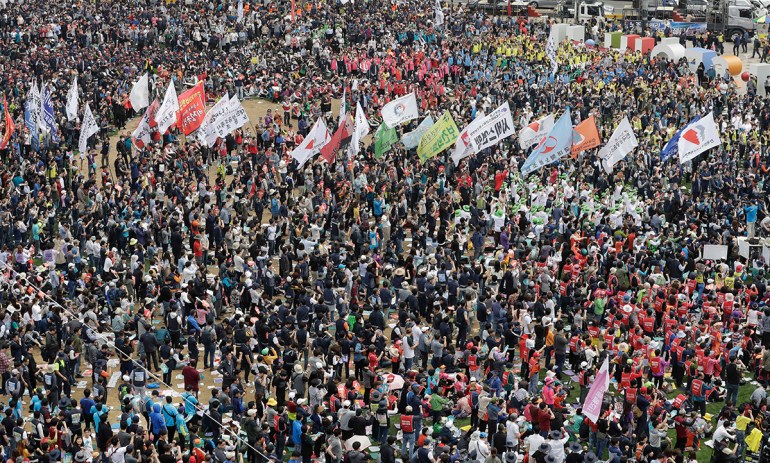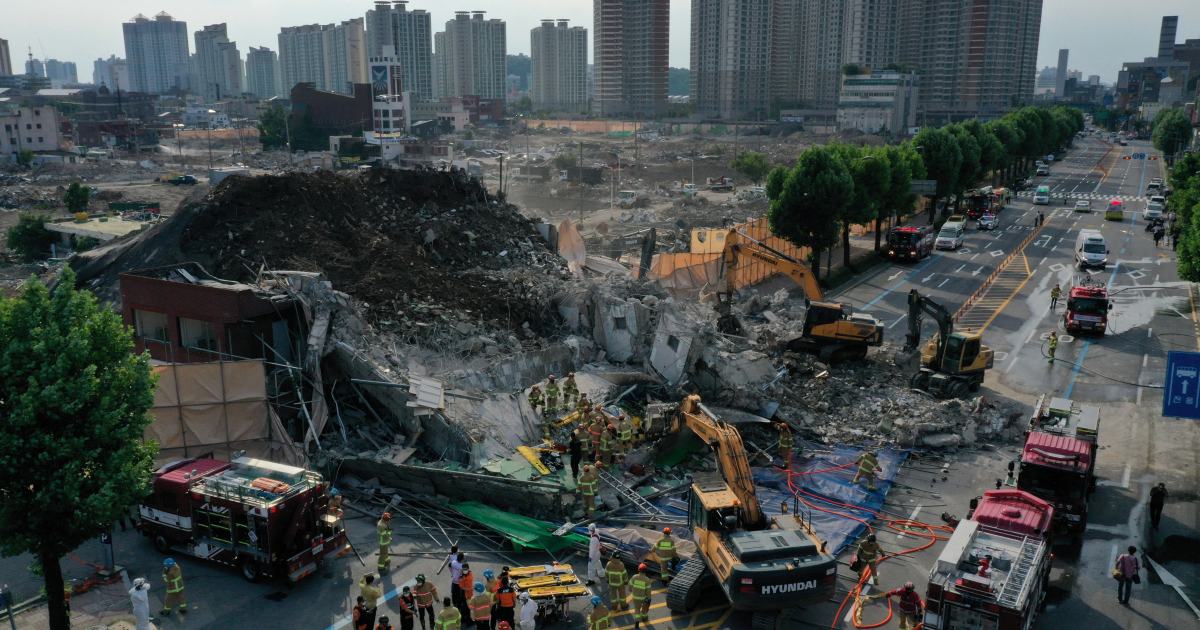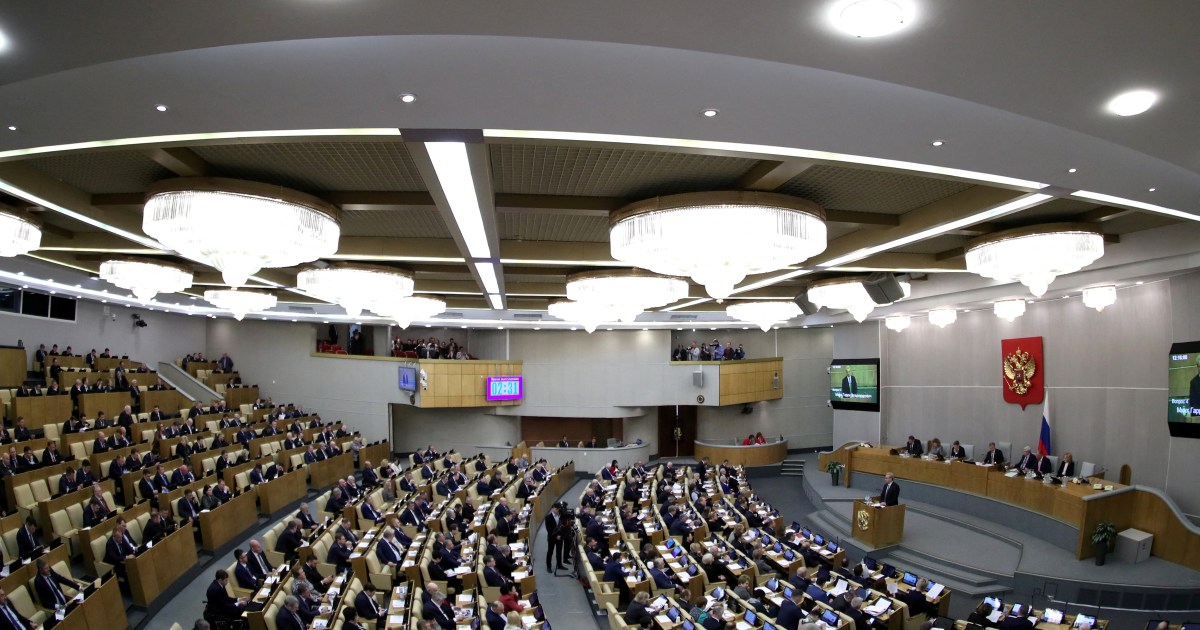South Korea puts CEOs on notice with contentious work safety law | Technology
Seoul, South Korea – In South Korea, “business as usual” is set to change drastically with the enforcement of legislation that can hold company management, including CEOs, legally responsible for workplace accidents.
The Serious Disasters Punishment Act, which came into force on Thursday, carries penalties of one year in prison or one billion won ($835,000) in fines for business owners and management in the event of accidents that cause death or serious injury.
As the law takes effect, its themes are already in the headlines, after the collapse of an apartment block under construction in the southern city of Gwangju earlier this month left several people dead or missing — only months after another building collapse in the city killed nine.
Labour advocates contend the law is a long-overdue shifting of responsibility onto business brass who for decades have operated workplaces, such as factories and construction sites, with dangerous working conditions while prioritising their bottom lines above their workers.
Business owners insist the law will have a chilling effect on the already-shaky South Korean economy by making companies reluctant to launch new projects while introducing mounds of new red tape.
A major criticism is that the legislation fails to spell out the grounds for top brass to be held personally liable for a workplace accident, as CEOs and senior management are generally not present on work sites and tend not to oversee the details of physical work.
“The significance of the law is that it stipulates a responsibility for management to prevent serious accidents and its purpose is to draw managers’ attention toward safety,” Kwon Hyuk, a law professor at Pusan National University, told Al Jazeera.
“The biggest problem with it is the ambiguity of its provisions. Because it imposes severe punishment, its provisions need to be very clear, but they are not.”
Another criticism is that smaller companies, which account for most employment in South Korea, lack the capacity to implement systems to ensure strict compliance with the law, or to cover legal fees that could be incurred.
“My concern is that the tip of the knife is now pointed at small and medium enterprises, and that the law could be enforced arbitrarily,” Jung Jin-woo, an expert on occupational safety at Seoul National University, told Al Jazeera. “The government created an atmosphere of fear and law firms took the lead.”
 Labour activists in South Korea have backed the legislation holding company management liable for workplace accidents [File: Lee Jin-man/AP]
Labour activists in South Korea have backed the legislation holding company management liable for workplace accidents [File: Lee Jin-man/AP]In a survey carried out in November by the European Chamber of Commerce in Korea, more than half of the 121 companies that responded said the law would make the country less attractive for investment.
The biggest concerns over the law were the “unclear scope and responsibilities of the manager” and insufficient time to prepare to comply with the law, the survey showed.
“Foreign companies may reduce the size of their business and put off new investment if their executive is punished by the Serious Disasters Punishment Act,” the chamber said in a statement.
The Ministry of Employment and Labour told Al Jazeera the government is consulting with smaller companies on how to improve their health and safety systems while providing financial support for accident-prevention projects.
“From now, safety is a necessity for business operators,” the ministry said.
Conflict between workers and management over safety is nothing new in South Korea, Asia’s fourth-largest economy. The country’s history is littered with high-profile accidents that stoked public outrage and raised questions over the tendency to cut corners or rush projects to completion to save money. According to government data, there have been 53 deaths from industrial accidents in the past five years.
Perhaps best known is the 1995 collapse of the Sampoong Department Store in Seoul. More than 500 people died in the collapse of the shopping centre, which had been considered a symbol of South Korea’s growing middle class. A subsequent investigation showed that shoddy construction materials and negligent management were factors in the disaster.
In 2014, hundreds of high school students died in the sinking of the Sewol ferry, a vessel that had undergone a risky refurbishment to increase the amount of cargo it could carry.
Given this grim history, some labour advocates argue the new legislation doesn’t go far enough.
‘Need to make companies more uncomfortable’
Jung Jae-hyun, an official handling workplace safety matters at the Korean Confederation of Trade Unions, told Al Jazeera that advocates would work towards extending the law to all workplaces with more than five employees, instead of 50 at present.
Jung said the law should also be broadened to implicate government officials tasked with overseeing safety matters, and should include a clause to specifically target owners of construction firms that order workers to speed up completion of projects to save labour costs.
The momentum for the Punishment Act was sparked in 2018 when Kim Yong-kyun, a 24-year-old thermal power plant worker, died on the job. Kim was crushed when he fell into machinery while working the night shift by himself. Labour advocates argued he should have been teamed with a partner who could have turned off the machinery and saved Kim’s life, and that his case was emblematic of how companies risk worker safety to trim labour costs.
After Kim’s death, his mother became a recognizable activist calling for the legislation that is now the law of the land.
She and others have long insisted that the big companies that dominate South Korea — which include global brands such as Samsung and Hyundai — have operated above the law for too long.
“Even now, many people sympathise with companies instead of workers,” Kwon Oh-seong, a professor of labour law at Sungshin University, told Al Jazeera. “Corporate managers take profits for themselves while they pass accidents and other costs onto society.”
“To fix this situation, I think we need to make companies a bit more uncomfortable,” Kwon said. “The passage of the Serious Disasters Punishment Act is the starting point for that process of fixing it.”




